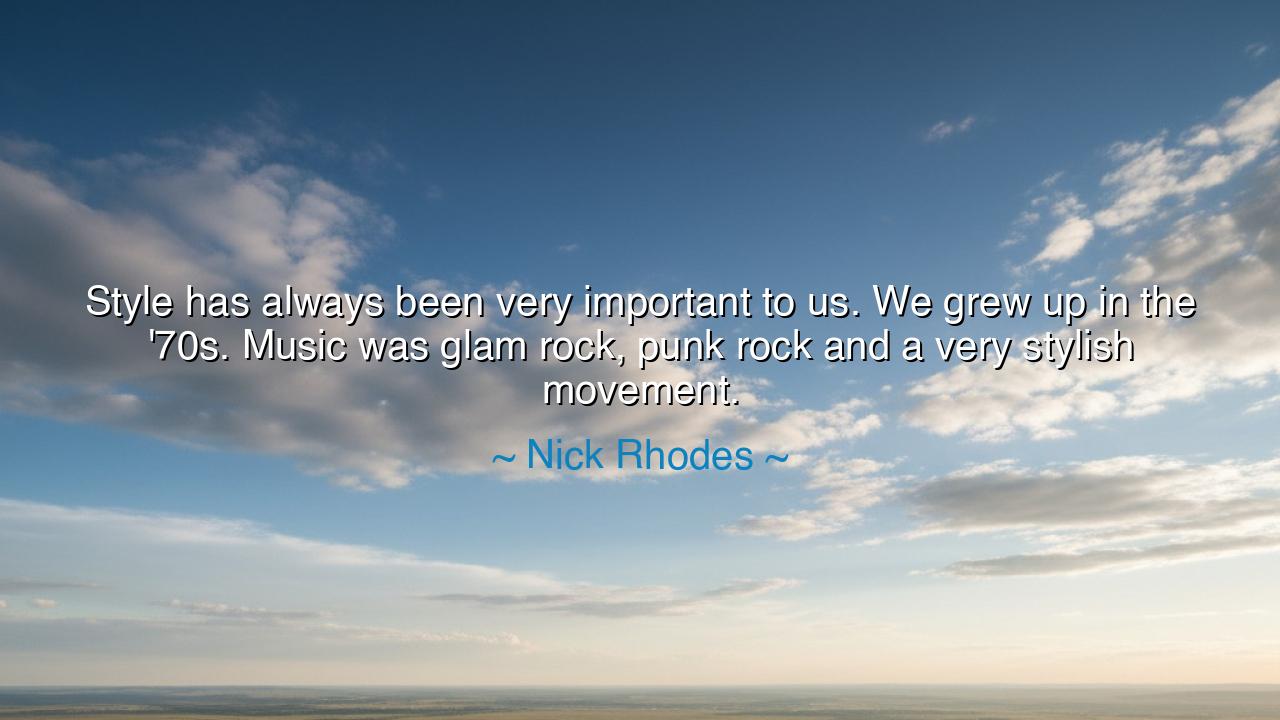
Style has always been very important to us. We grew up in the
Style has always been very important to us. We grew up in the '70s. Music was glam rock, punk rock and a very stylish movement.






Nick Rhodes, the visionary of Duran Duran, once proclaimed: “Style has always been very important to us. We grew up in the '70s. Music was glam rock, punk rock and a very stylish movement.” These words are more than the reflection of a musician—they are the testimony of an age, the witness of a generation that discovered that style is not decoration, but declaration. It is the outward expression of inner fire, the visible banner of unseen rebellion, the cloak that reveals the soul.
The 1970s were a crucible of transformation. In that age, music did not merely echo—it dazzled. The glitter of glam rock carried the power of spectacle, merging sound and vision into one radiant force. Men and women clothed themselves in sequins, feathers, and light itself, declaring that identity could be reimagined, that the self was not bound by custom but could shine as boldly as the stage itself. Style was not vanity, but freedom—an act of defiance against a world that sought to impose gray uniformity.
Then came the raw flame of punk rock. Where glam had shimmered with opulence, punk struck like a hammer—harsh, stripped-down, yet equally stylish in its fury. Torn clothes, spiked hair, leather jackets: these were not merely garments, but battle armor. The punk youth declared war against complacency and conformity, forging a new world in the fires of sound and fashion alike. Thus, music and style walked hand in hand, each amplifying the other, each giving voice to the same cry: we will not be silent, we will not be invisible.
History has shown us many such unions of style and power. Recall the samurai of Japan, whose armor was as much a work of art as a weapon. The gleaming plates, the colors, the crests—all spoke before the sword was even drawn. Or consider the revolutionaries of France, who donned the red cap of liberty to proclaim their defiance. In every age, style has been more than fabric or adornment—it has been language, identity, and the banner of a cause. Nick Rhodes reminds us that music in the 1970s carried this same sacred force.
Yet the wisdom here is not only of the past. Rhodes’s words tell us that style shapes culture, and culture shapes destiny. To dismiss style as superficial is to misunderstand its power. The clothes we wear, the art we embrace, the music we follow—these are extensions of our spirit, signals to the world of who we are and what we believe. When style unites with music, it creates movements that inspire millions, giving not only sound to a generation, but vision.
The lesson for us is clear: never despise the importance of style. It is not shallow—it is symbolic. Whether in how you dress, how you create, or how you carry yourself, let your style reflect your values and your vision. Do not merely follow fashion, but forge it into a language that declares your place in the world. Just as the glam rockers turned glitter into glory, and the punks turned rags into rebellion, so too can you use style as a weapon of self-expression.
So, children of tomorrow, let this truth be your guide: style is the armor of the spirit. Wear it with courage. Use it to express the music of your soul, the values of your heart, and the fire of your generation. For when sound and style unite, movements are born, and history itself is changed.
Thus remember: the 1970s were not merely a time of music, but of transformation. And Nick Rhodes, in recalling it, reminds us that style and music together can awaken identity, inspire freedom, and shape the destiny of nations. Let your life, too, be a stylish movement—bold, authentic, and unforgettable.






AAdministratorAdministrator
Welcome, honored guests. Please leave a comment, we will respond soon